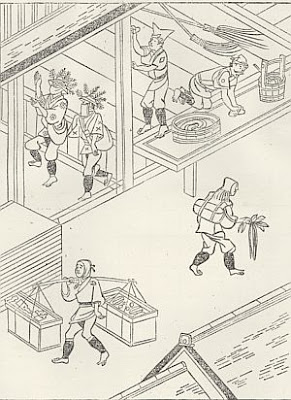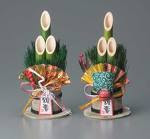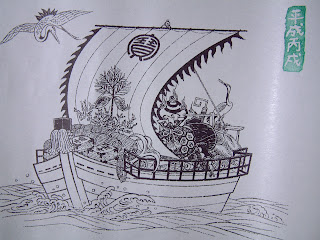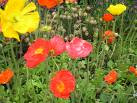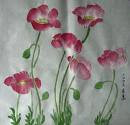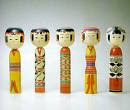::::::::::::::::::::::::::::::::::::::::::::::::::::::::::::::::::::::::::::::::::::::::::::::::::::
Fulling block (kinuta)
***** Location: Japan
***** Season: All Autumn
***** Category: Humanity
*****************************
Explanation

Fulling blocks are wooden mallets used to beat the washing to get it dry and soft during the Edo period. They also gave a special shine to the beaten cloth. They were hit on a wooden block or on stone, sometimes near the river where the washing was one. "Pounding cloth" is another translation of this activity.
This is one of the evening jobs of a farming family, called "night work" yonabe, see below.
The name KINUTA seems to have derived from kinu ita 衣板, a board for beating silk.
This kind of mallet is also used for other material to make it soft for processing into goods, as in the kigo for straw, paper and arrow root. This kind of work was often done in the dark evenings by the farmers wifes, since they had so many other jobs to do during daytime light.
fulling-block
Gabi Greve

kinuta . . .
chirps of the crickets
between beats
- Shared by Elaine Andre -
:::::::::::::::::::::::::::::::::::::::::::::::::::::::::::::::::::::::::::::::::::::::::::::::::::::
fulling block, washing mallet, kinuta 砧 (きぬた)
hitting with the mallet, kinuta utsu 衣打つ(ころもうつ)
hitting cloth with a mallet, toui 擣衣(とうい)
using the washing mallet in the evening, yuu kinuta 夕砧(ゆうきぬた)
..... yoi kinuta 宵砧(よいきぬた)
..... sayo kinuta 小夜砧(さよきぬた)
hearing the beating sound of a washing mallet from afar
too kinuta 遠砧(とおきぬた)
fulling block mallet, kinuta no tsuchi 砧の槌(きぬたのつち)
block for the mallet, kinuta ban 砧盤(きぬたばん)
mallet for beating straw, wara kinuta 藁砧(わらきぬた)
To make the straw softer for processing into goods like straw sandals or straw raincoats in the Edo period.
Other uses for hitting material to make it softer and workable:
mallet for hitting paper, kami kinuta 紙砧(かみきぬた)
mallet for hitting arrow root, kuzu kinuta 葛砧(くずきぬた)
::::::::::::::::::::::::::::::::::::::::::::::::::::::::::::::::::::::::::::::::::::::::::::::::::::
Traditional "ironing" in Korea and Japan
In Korea the drumming of traditional ironing sticks was traditionally called a joyful sound. Even though it didn't please all ears, it was a symbol of a secure home life. In Japan the beating of a single mallet pounding fabric smooth was associated with melancholy - in poetry at least. In Korea two women knelt on the floor, facing each other across a smoothing stone or tatumi-tol, a pangmangi club in each hand, beating out a rhythm on the cloth. This kind of "ironing" looks more solitary in Japanese art, where a woman kneels alone before a fulling block or kinuta and hammers with a single mallet. ...
The Japanese fulling-block and Korean smoothing-stone, like so many other tools used in pressing cloth, had their uses in manufacturing new cloth as well as in maintaining laundered fabric. (Fulling involves beating the fibres to make the cloth thicker and/or softer.)
Read the full article with photos HERE
© www.oldandinteresting.com
:::::::::::::::::::::::::::::::::::::::::::::::::::::::::::::::::::::::::::::::::::::::::::::::::::::
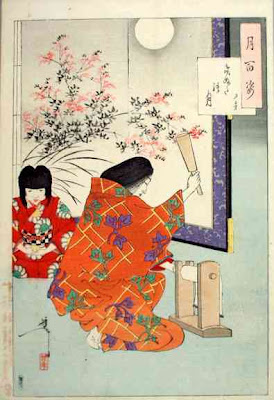
The woman pounding cloth on a fulling block is the heroine of a Noh play.
The wife strikes the block throughout the night hoping that the sound will reach him in the distance and hasten his return.
The idea is based on a Tang dynasty Chinese poem in which the sound of cloth being beaten by his wife reaches the ears of a man far from home.
© www.internationalfolkart.org
:::::::::::::::::::::::::::::::::::::::::::::::::::::::::::::::::::::::::::::::::::::::::::::::::::::
kinuta odori 砧踊り fulling-block dance
明日は殿御(とのご)の砧打ち 明日は殿御の砧打ち
御方姫御(おかたひめご)も出てうたへ
砧踊りは面白や 砧踊りを一踊り
Tomorrow is fulling-block time for the Lord!
Tomorrow is fulling-block time for the Lord!
The Lady will also come out to sing.
The fulling-block dance is so funny!
Come on,let us dance the fulling-block dance!
source : 青柳
*****************************
Worldwide use
*****************************
Things found on the way
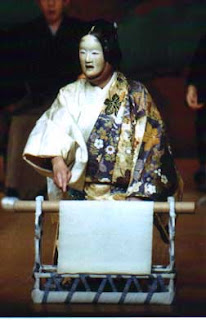
Noh Drama "The Fulling Block" Kinuta
能 砧
A woman whose husband has spent three years in the capital hears that he will return at the end of the year, but is later informed that he is unable to return, leading to her insanity from disappointment, loneliness, and hatred and eventually to her death.
The husband, upon learning of this, returns and ritually summons her ghost, which appears in an embittered mood and expresses resentment for having suffered in Hell; through the power of the Lotus Sutra, however, she eventually attains peace.
More information
*****************************
HAIKU
砧打て我に聞かせよや坊が妻
kinuta uchite ware ni kikase yo ya boo ga tsuma
pounding cloth
for me to hear ...
the wife of the priest
Tr. Gabi Greve
Matsuo Basho 芭蕉
Basho spent the night in a temple lodging.
From: Bleached Bones in a Field
. Matsuo Basho in Yoshino .
beat the fullilng block,
make me hear it -
temple wife
Tr. Barnhill
Strike the fulling block
let me hear it!
temple mistress
Tr. Shirane
Женщина из храма,
бей по валочной доске -
ну же, посильней!
МАЦУО БАСЁ (1644-1694) / Tr. D. Smirnov
quote
Basho was in Yoshino, rich in poetic and religious traditions. Clothes were pounded on a fulling block to clean and soften them, and in the poetic tradition the sound was associated with loneliness. The fulling block was not commonly used in Basho ’s time, but he wishes to hear its sound in order to feel deeply what was considered the essential nature of Yoshino in autumn.
There is an allusion to a waka by Fujiwara Masatsune (1170–1221):
At Yoshino
the mountain wind
deepens into the night,
and in the old village
a fulling block is struck
(miyoshino no / yama no akikaze / sayo fukete
furusato samuku / koromo utsunari).
Tr. and Comment by Barnhill
source : www.haikupedia.ru
.............................................................................
声澄みて北斗にひびく砧かな
koe sumite hokuto ni hibiku kinuta kana
its sound clear,
echoing to the Northern Stars:
a fulling block
Tr. Barnhill
This hokku has the cut marker KANA at the end of line 3.
.............................................................................

猿引は猿の小袖を砧哉
saru hiki wa saru no kosode o kinuta kana
a monkey showman
with a little monkey jacket
on a fulling block
Tr. Barnhill
Written in 貞亨元年, Basho age 41 or later
a monkey trainer
pounds (cloth) for a little monkey coat
on the fulling block . . .
Tr. Gabi Greve
. WKD : saruhiki 猿曳 、猿引 monkey trainer.
. Matsuo Basho 松尾芭蕉 - Archives of the WKD .
:::::::::::::::::::::::::::::::::::::::::::::::::::::::::::::::::::::::::::::::::::::::::::::::::::::

The Cloth-fulling Jewel River 壔衣の玉川
鈴木春信 Suzuki Harunobu (Museum of Fine Arts, Boston)
:::::::::::::::::::::::::::::::::::::::::::::::::::::::::::::::::::::::::::::::::::::::::::::::::::::
- - - - - Kobayashi Issa - - - - -
えた町も夜はうつくしき砧哉
eta mura mo yo wa utsukushiki kinuta kana
in the outcasts' village too
a lovely night...
pounding cloth
Sakuo Nakamura writes, "In my native town there is an eta village; mothers tell their children not to enter there. Issa has a very peaceful mind. He know well the sadness of living. When he saw the Eta village in the night, not only darkness covered, but racial discrimination as well. And he heard the sound of the kinuta as if it came from Buddha."
In Japan and Korea, fulling-blocks were used to pound fabric and bedding. The fabric was laid over a flat stone, covered with paper, and pounded with sticks, making a distinctive sound. This haiku refers to the outcasts (eta). In Issa's time, they performed "unclean" jobs such as disposing of dead animals, working with leather, and executing criminals. In my earlier translation, I use the phrase, "fulling-block," an arcane term that means nothing to most English readers. "Pounding cloth" is a translation solution provided by Makoto Ueda, whose example I gratefully follow; Matsuo Bashô (Tokyo: Kodansha, 1982) 53.
砧打夜より雨ふる榎哉
kinuta utsu yo yori ame furu enoki kana
pounding cloth
in the night...
rain on the nettle tree
故郷や寺の砧も夜の雨
furusato ya tera no kinuta mo yoru no ame
home village--
pounding cloth at the temple
and evening rain
唐の吉野もかくや小夜ぎぬた
morokoshi no yoshino mo kaku ya sayo-ginuta
like in Old China
Yoshino, too, clonks...
cloth-pounding
In Japan and Korea (and--we see in this haiku--Old China), fulling-blocks were used to pound fabric and bedding. The fabric was laid over a flat stone, covered with paper, and pounded, making a distinctive sound. For Issa, the sound evokes a nostalgic feeling. Yoshino is a famous place (in Japan) for viewing the cherry blossoms.
Tr. David Lanoue / Read MORE !
More of Issa's haiku about pounding cloth, using
Onomatopoetic Words !
is even the Yoshino
in China like this?
fulling cloth at night
snip
Issa alludes to a number of classical poems in order to praise other mountains and thus strengthen his case that tonight the mountains around him are surely even more moving. There is of course no Mt. Yoshino in China. It is hyperbole for the most remote place in the world, a phrase made famous by waka no. 1049 by Fujiwara Tokihira in the courtly Kokinshuu anthology:
morokoshi no yoshino no yama ni komoru to mo
okuremu to omou ware naranaku ni
even if you
seclude yourself in
Mt. Yoshino in China
I will follow after
the whole way
snip
Later the image was often interpreted to mean "the Chinese equivalent of Mt. Yoshino," and in Travel Record of a Weather-Bleached Skeleton (Nozarashi kikou) Basho writes that the holy men who secluded themselves on Mt. Yoshino and wrote poems there felt that the Chinese equivalent of Mt. Yoshino was Mt. Lu, where many monks and poets retired.
. Chris Drake - the full comment .
. Kobayashi Issa 小林一茶 in Edo .
::::::::::::::::::::::::::::::::::::::::::::::::::::::::::::::::::::::::::::::::::::::::::::::::::::
- - - - - Yosa Buson - - - - -
このふた日砧聞えぬ隣かな
kono futahi kinuta kikoenu tonari kana
the last two days
no sound of beating cloth
from the neighbours . . .
Tr. Gabi Greve
遠近をちこちとうつきぬた哉
ochikochi ochikochi to utsu kinuta kana
near and far
here and there the beating sound
of fulling blocks . . .
Tr. Gabi Greve
Buson uses the Chinese characters and hiragana type of spelling words in a masterly way. This is one of the language forms of haiku that just can not be captured in a translation.
The cut marker KANA is at the end of line 3.
Far and near, near and far,
they clop and clop......
wooden cloth fulling blocks!!
This haiku is near to impossible to translate because Buson has captured the onomatopoeia of the blocks being hit with the twice repeated sound of 'ochikochi', thus also presenting an image within the sound of the blocks hitting the cloth.
The book 'Buson and Chinese Poetry' makes the argument that he is alluding to another poem by Li Bai. I could only find the first two lines of this poem translated on the internet:
'The whole Chang'an is covered by bright moonlight
From tens of thousands of houses comes the sound of clothes beating.'
To paraphrase the rest of the poem from the book, the autumn wind never stops, all the women in the area think of their husbands far off at war and wonder when they will return home. It is hard to ignore the at war part of the original poem if you choose to read the allusion into it. The book does take to task commentators who have argued that it was the sound from one place or the sound of a mother and daughter who fulling clothes together by saying that Li Bai did write '10000 doors'. And, he did write the kanji that means 'far and near' when if he didn't want to include it all he had to do was write it in hiragana.
The haiku is only 16 morae.
- Tr. and comment :James Karkoski - facebook -
- Yosa Buson 与謝蕪村 (1716-1783)
- - - more kinuta hokku by Buson
貴人(あてびと)の岡に立ち聞く砧かな - atebito no
小路行けば近く聞ゆる砧かな - kooji ikeba
霧深き広野に千々の砧かな - kiri fukaki
砧聞きに月の吉野に入る身かな - kinuta kiku
比叡にかよふ麓の家の砧かな - Hiei ni kayou
旅人に我家知らるる砧かな - tabibito ni
憂き我に砧うて今は又止みね - uki-ware ni
*****************************
Related words
***** nightwork, evening at home, yonabe
夜業 (夜なべ)
..... yagyoo 夜業
..... yoshigoto 夜仕事
... tawara ami 俵網 (たわらあみ) making straw bags
komedawara amu 米俵編む(こめだわらあむ)making straw bags for rice
sumidawara amu 炭俵編む(すみだわらあむ) making straw bags for charcoal
Yonabe night work and the pounding of cloth reminds the Japanese of the hometown, home village ...
FURUSATO haiku
ふるさと 故郷、古里 故里 郷土 郷里
***** Mallet for good luck, (fuku-tsuchi 福槌)
kigo for the New Year
You hammer your straw, make straw sandals out of it, sell them and voila, you are a rich man.
:::::::::::::::::::::::::::::::::::::::::::::::::::::::::::::::::::::::::::::::::::::::::::::::::::::
[ . BACK to DARUMA MUSEUM TOP . ]
[ . BACK to WORLDKIGO . TOP . ]
:::::::::::::::::::::::::::::::::::::::::::::::::::::::::::::::::::::::::::::::::::::::::::::::::::::
